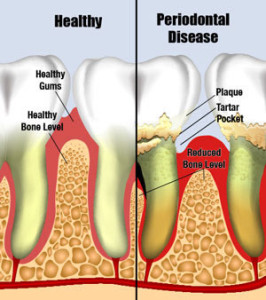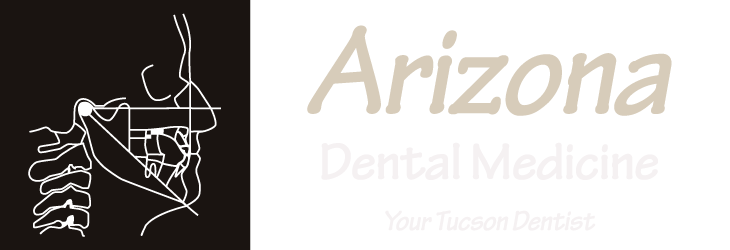 Periodontal disease (gum disease) is an infection of the tissues (gums) that support the teeth. The gums do not attach very firmly to the teeth. There is a shallow v-shaped gap existing between the teeth and gums where periodontal disease easily thrives.
Periodontal disease (gum disease) is an infection of the tissues (gums) that support the teeth. The gums do not attach very firmly to the teeth. There is a shallow v-shaped gap existing between the teeth and gums where periodontal disease easily thrives.
There is a lot of bacteria in your mouth. The bacteria and food particles combine and cause a sticky film that clings to your teeth called plaque. Thorough brushing and flossing every day (best after every meal) removes most of the plaque but all too often not all of it especially around the gum line. The bacteria in plaque creates a toxin that may injure the gums and all supporting tissues.
There are many factors that increase your chance of developing periodontal disease. These range from oral habits, diet and disease to pregnancy and medications.
How do you know if you have it? Here are some of the most common sign and symptoms:
- Gums may be red, swollen, tender or bleed during brushing/flossing
- Root surfaces may be exposed
- Experience pain with chewing or increased sensitivity to hot and cold
- Calculus or tarter build-up
- Loose teeth
- Changes in your bite or tooth position
- Bad breath
Periodontal disease doesn’t just effect your oral health. It can effect your overall health in many ways. It has been known to cause:
Cardiovascular disease and stroke – As bacteria colonies grow the immune system may not be able to keep them in check. The oral bacteria can then enter the blood stream and attack the arteries and cardiovascular system. New research indicates that people with periodontal disease are twice as likely to develop cardiovascular disease.
Bacterial pneumonia – The bacteria in your mouth can be inhaled or aspirated into your lungs thus causing infections and pneumonia.
Increased risks during pregnancy – Studies indicate that women with periodontal disease are more likely to give birth to underweight or premature babies.
Periodontal disease is the primary cause of teeth loss after the age of 35.
Some people are more susceptible than others. This can be reversed, if caught early, and properly cared for.
Have you had a recent checkup with your dentist to see if you have periodontal disease? If not then call us at Arizona Dental Medicine to make your appointment today – 520-297-9069. Your health depends on it!
